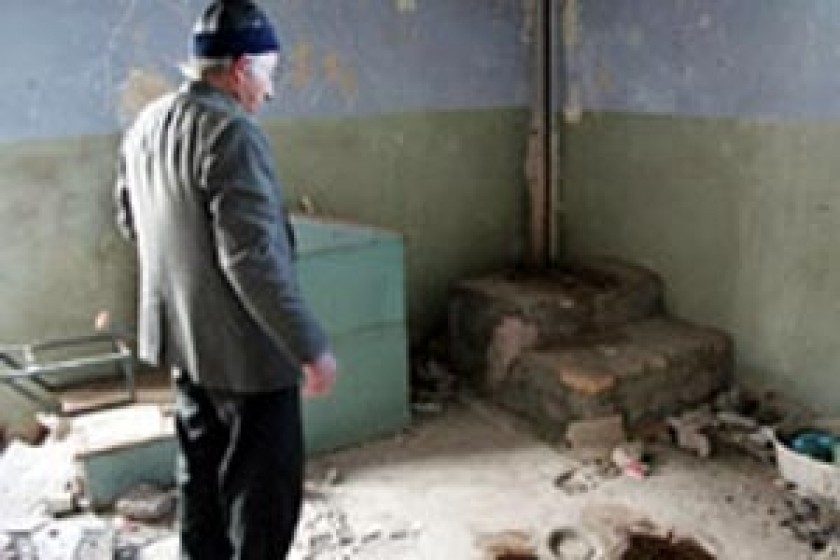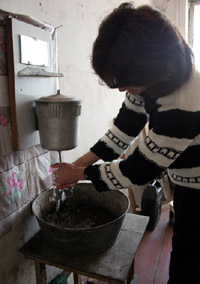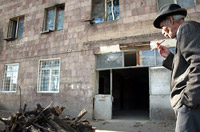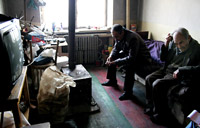
Let Us Die With Dignity
Eighteen refugees, many of them with their families, are spending the bleakest days of their old age in the most basic of living conditions. They live at a shelter not resembling a home in the least, under a shabby roof and without even a lavatory.
Misery has a specific smell. To experience it, all one has to do is visit the hostel located at Atarbekyan 101 in Echmiadzin, where our compatriots expelled from Azerbaijan have been living since 1988.
“Nobody had come here before, no one had expressed any interest in us. It's as if we never existed back then and don't exist now, either. Nobody cares about how we live, how we feed ourselves with the mere 10,000-dram allowance they provide or how we heat this so-called house. They probably don't even remember that they had brought and left people here 18 years ago,” confided Amalya Oganezova.
 84-year old Knarik Atabekyan, a veteran of the Second World War, interrupted her neighbor and continued on the same topic, after bringing a small case with photographs and medals. “I wasted my young years in the war – I lost my husband, and I'm dragging the years of my old age within the ruined walls of this hostel. I was wounded twice. I received great honors and medals for my service. On May 7, Robert Kocharyan awarded me a medal and congratulated me in person on the occasion of the Day of Victory and Peace. But nobody says, ‘We must help this old woman have a normal roof above her head so that she can live the last years of her life with peace in her soul.'”
84-year old Knarik Atabekyan, a veteran of the Second World War, interrupted her neighbor and continued on the same topic, after bringing a small case with photographs and medals. “I wasted my young years in the war – I lost my husband, and I'm dragging the years of my old age within the ruined walls of this hostel. I was wounded twice. I received great honors and medals for my service. On May 7, Robert Kocharyan awarded me a medal and congratulated me in person on the occasion of the Day of Victory and Peace. But nobody says, ‘We must help this old woman have a normal roof above her head so that she can live the last years of her life with peace in her soul.'”
For the past 18 years, the residents of this hostel have started their day by carrying buckets of water from the houses in the vicinity.
“But to what extent is this appropriate? They have meters and pay for the water used. They have closed the gates for the past few days so that we don't go there. I don't blame them, but at the same time I cannot imagine how we will deal with the water issue after this… we deserve pity… we are 70-80 years of age - old, ill women. Do you think it is easy to carry buckets of water up three or four floors everyday? A couple of days ago I nearly passed out on the staircase while the buckets of water were in my hand, but Nahatakyan saved the day (Nahatakyan is the principal of the school functioning in the neighborhood, and also one of the residents of the hostel),” narrated Greta Movsesyan.
“I have contracted every illness you can think of in this building – some through the cold, others through constant worrying. Everything is a problem here – shouldn't a person have at least the convenience of a toilet? It's still possible to make do in the summer, but do you know what we do in the winter?” asked Vazgen Sarkisov, providing the answer himself, “We fulfill our basic needs in buckets or plastic bags and take it out ourselves. We eat and sleep in the same room where we cook and go to the toilet.”
A “delegation” of five of the refugees had recently been to City Hall to inform them of their problems with water, natural gas and their situation in general.
 |
 |
“The problem of fuel seemed to concern them the most. We have a program providing poor families with firewood, so we including the residents of the hostel as well. We will send them firewood soon,” said Echmiadzin mayor Gagik Avagyan, who had also promised the “delegates” that he would visit them before the end of the year and see how each of them lived.
“But he did not make any promises about renovating the building and giving the renovated apartments to us,” one of the “delegates” noted.
“City Hall has no authority over the hostel building,” countered Hamlet Nahatakyan, a veteran of the Karabakh war, commander of the first volunteer platoon, Armenian Supreme Council member from 1991 to 1995 and long-time resident of the hostel. “The building used to be a hostel under Professional Technical School number 27 until 1991. When I founded the Nersisyan school in 1991, the building and the hostel were transferred to its account. Thus, all authority regarding the building lies with the administration of the school.”
The hopes that residents had of owning houses has diminished with each day. Now, they suggest instead that the building be securely renovated and privatized in their name.
“Some rich people came recently to buy the building. We were worried that they might buy it and turn us out. We went to the UN office for refugee issues and were told that nobody had the right to evict us until we were offered a new residence. We calmed down a little bit after that but there is talk again that the building will be bought,” said one of the gathered refugees.
Hamlet Nahatakyan confirmed the rumors about interest in buying the building. “There are some rich people who want to buy it. Can you imagine the condition of these elderly people if I agree? They will literally end up on the street. But one can avoid that by having the building renovated and transferring ownership to the residents. No more buyers will turn up after that and the refugees will be satisfied.”
The refugees were greater in number here from 1988 to 1995. Those who had any financial means at hand left for other countries, while apartments were allocated to some others. 80 of them died over the last 18 years. The remaining 18 wait with hope for their turn to be granted an apartment.
“We've gone everywhere possible – the UN High Commissioner for Refugees as well as the Department of Migration and Refugees. They make promises in their written replies, but we've been waiting in vain for years… how long can you keep people waiting with promises? We have nothing to live for anymore. They keep postponing it on purpose, so that we die and the problem is solved,” said Seda Khachatryan.
Photographer Anush Babajanyan
 Videos
Videos Photos
Photos
Write a comment